Centre for Policy Development's Blog, page 8
July 4, 2023
Submission to the Inquiry into Workforce Australia Employment Services
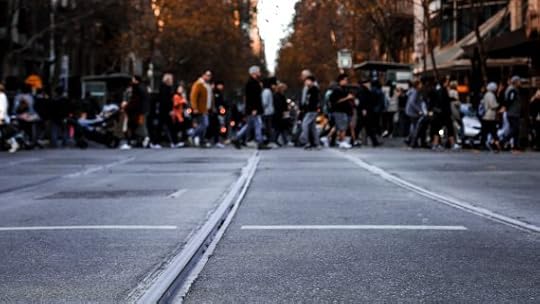
The Centre for Policy Development, together with The Brotherhood of St Laurence and the University of Melbourne, made a submission to the Inquiry into Workforce Australia Employment Services that puts forward a number of recommendations to reform Australia’s employment services system.
It found that the current employment and training system is failing jobseekers by not building the capability and confidence they need to achieve long-term economic security, instead leading to job outcomes that are short-term and insecure. Those who face complex barriers to work were significantly underserved, trapping too many marginalised individuals in long-term poverty and disadvantage.
The submission highlights that it will be necessary to shift towards a collaborative, people- and place-centred and industry focused approach to service system design and delivery in order to transform the employment services system into one that allows jobseekers, business and communities to thrive.
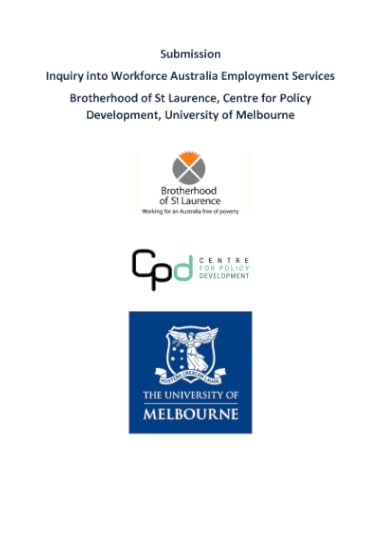 READ THE PAPER [PDF]
READ THE PAPER [PDF] To achieve this it recommends:
A mindset shift; from a deficit and compliance lens to a focus on investing in people’s capabilities.A flexible place-based universal system; that shifts from a one-size-fits-all, any-job-is-a-good-job model to one that is tailored and shaped by local conditions and individual needs.An evidence-informed, person-centred service and practice model; that builds capability and confidence to pursue meaningful career and life goals, connects to skills and training for quality jobs, and invests in employers to create demand-side opportunities.A change in the role of government; from an arm’s-length ‘purchaser’ of employment services to active co-producer of employment servicesThe submission notes the significant wellbeing and material security benefits of decent, secure employment, and shows that transitioning away from the current market model of the system will achieve better outcomes for jobseekers, employers, industry and community.
The post Submission to the Inquiry into Workforce Australia Employment Services appeared first on Centre for Policy Development.
July 2, 2023
CPD ASEAN Chair 2023 Side Event
CPD has continued its high profile work in Indonesia with our consortium of partners to support Indonesia as the 2023 ASEAN Chair in its priorities in the energy transition sector.
Taken as a bloc, ASEAN represents the fifth-largest economy in the world, with a collective GDP of $3.2 trillion and a combined population of over 660 million people. As the ten ASEAN member states continue to develop, energy consumption needs are rapidly increasing and represent a significant opportunity for our region to boost renewable energy. But to achieve this the region requires significant technical and financial investment. Indonesia alone is estimated to require $1 trillion by 2060.
Indonesia as ASEAN Chair identified sustainable energy security and interconnectivity, and sustainable energy financing as two of its four priorities in the energy sector over 2023, which continues the priorities of their 2022 G20 Presidency. CPD, together with our partners listed below, is delighted to have been recognised as an official partner to the Indonesian ASEAN Chairship, and Annabel Brown and Ruddy Gobel spoke at the official kick off event in March.
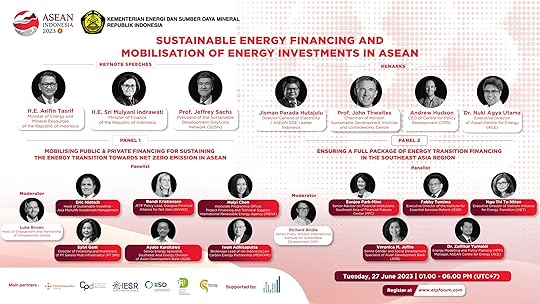
On 27 June, we held a hybrid event in Jakarta and online to discuss sustainable energy financing, including ideas for an ASEAN Green Deal and ASEAN Renewable Energy Roadmap. The event featured remarks from Prof Jeffrey Sachs (President, Sustainable Development Solutions Network), Prof John Thwaites (Chair, Monash Sustainable Development Institute), and representatives from the Indonesian Ministry of Finance, Ministry of Energy and Mineral Resources, ASEAN Centre for Energy, GFANZ, IRENA, ADB and others.
The first panel discussed how ‘blended’ public and private finance can help achieve net zero emissions, while the second panel discussed how to go beyond project financing in supporting the just energy transition. Both emphasised the huge potential of the Southeast Asia region to come up with concrete suggestions for policy change, and also the role of Australia in partnering with Southeast Asia on this journey.
This work is part of an ongoing suite of events we are holding with Indonesia as the ASEAN Chair, and will be complemented by policy briefs to support the September ASEAN Summit. We are grateful to our partners in this event, namely Climateworks Centre, the International Institute for Sustainable Development, Institute for Essential Services Reform, the Indonesian Research Institute for Decarbonisation, the Purnomo Yusgiantoro Centre and the Asia Investor Group on Climate Change. We look forward to continuing to work with the ASEAN Cooperation Coordinator for the Energy Sector over the remaining six months of Indonesia’s time as ASEAN Chair.
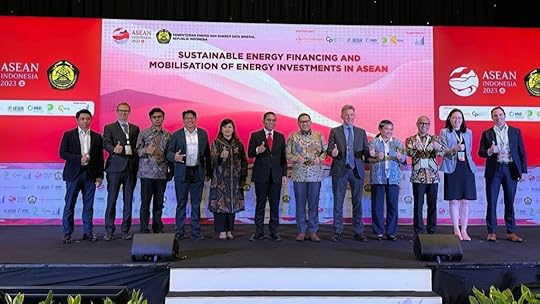
The post CPD ASEAN Chair 2023 Side Event appeared first on Centre for Policy Development.
June 28, 2023
MEDIA RELEASE: CPD EMPHASISES COMMITMENT TO CLIMATE CHANGE AND ENERGY TRANSITION ACTIONS DURING INDONESIAN PRESIDENT’S VISIT
The Centre for Policy Development (CPD) welcomes Indonesian President Joko Widodo’s visit to Australia next week, underscoring it as a pivotal opportunity to bolster the strategic partnership between the two nations.
In just 7 years, the Indonesian economy is forecast to be bigger than Germany or the United Kingdom, on its way to eventually being the fourth largest economy in the world. The Australian government is right to focus on enhancing this vital relationship that has been overshadowed in the past.
As the world’s two largest coal exporters, both countries bear a shared responsibility to spearhead regional energy transition. Indonesia is Chair of ASEAN this year, providing a decisive opportunity to solidify collaborative strategies on climate change and just transition.
CPD recommends intensified collaboration on renewable energy, including advancing the idea of an ASEAN Green Deal, as ASEAN develops its long-term renewable energy roadmap.
Initiatives such as the Australia-Indonesia $200 million Climate & Infrastructure partnership should be used strategically and meet local Indonesian needs. CPD’s Australia-Indonesia Energy Transition Policy Dialogue offers an ideal platform for ideation and innovation.
CPD also highlights the significant potential in Indonesia’s renewable energy sector for Australian investment, including through superannuation funds. Increased investor engagement should be prioritised to increase awareness of opportunities, notably in local electric vehicle development.
Additionally, CPD stresses the need to leverage untapped potential in constructing clean energy supply chains across Australia, Indonesia, and the broader region.
The Australia-Indonesia relationship also plays a significant role in managing forced migration and displacement. Australia and Indonesia are co-chairs of the Bali Process on People Smuggling, Trafficking in Persons and Related Transnational Crime. CPD calls on both countries to make the most of the active Consultation Mechanism to coordinate a response to the regional refugee crisis and prioritise effective protection-focused strategies, beyond awareness-raising.
A joint effort by Australia and Indonesia to facilitate the resettlement of long-term displaced Afghans in Indonesia should also be a priority. This could fit into Australia’s existing commitment to resettle 31,500 Afghans over four years or align with the Government’s objective to increase the annual humanitarian quota to 27,000. This collaborative action is crucial not only for fulfilling these targets but also to improving the lives of those stuck in limbo for a decade and improving Australia’s international reputation.
Centre for Policy Development CEO Andrew Hudson said that the Indonesian President’s visit to Australia presents a tremendous opportunity to build on the partnership between the two nations.
“As long-time allies, Australia and Indonesia hold a pivotal role in our region. With Indonesia’s escalating influence as a global leader, it is essential for Australia to strengthen this critically important relationship.”
On the issue of energy transition, he added, “No single country can tackle the climate crisis alone, which is why it’s vital that Australia and Indonesia jointly spearhead this decarbonisation journey. Frameworks like the ASEAN Green Deal are essential for energy transition within the region and driving us towards a sustainable future.”
He also reiterated the importance of this visit on tackling other regional challenges.
“Australia and Indonesia have repeatedly demonstrated their capacity to pioneer compassionate, impactful strategies to address displacement in the region. President Widodo’s visit is an opportunity to intensify our commitment to aiding those escaping violence and persecution, not least from Myanmar where more than 3,600 civilians have been killed since the military coup in 2021.”
ENDS
The post MEDIA RELEASE: CPD EMPHASISES COMMITMENT TO CLIMATE CHANGE AND ENERGY TRANSITION ACTIONS DURING INDONESIAN PRESIDENT’S VISIT appeared first on Centre for Policy Development.
Submission to the Productivity Commission Inquiry into Early Childhood Education and Care

Our Early Childhood Development Program recently made a submission to the Productivity Commission’s Inquiry into Early Education & Care that articulates the need for a high-quality universal Early Childhood Education & Care (ECEC) and recommends the government shift its focus from being simple provision of a service that can be provided by the market to system stewards.
The shift would require governments to move away from just determining who is eligible for public support and the amount they should receive. Instead, ECEC should be regarded as an entitlement and a central part of Australia’s social contract, much like schooling and healthcare.
The submission identifies that the current system doesn’t serve as an appropriate foundation for a universal system. The reasons for this are interconnected, including issues related to governance, quality, access, affordability, siloing from other services, data, and workforce.
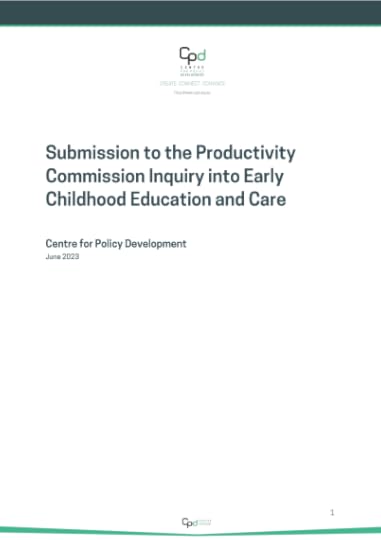 READ THE PAPER [PDF]
READ THE PAPER [PDF] The submission recommends a number of reforms concerning governance, funding, and delivery. These need to be considered in the context of a connected, holistic early childhood development system.
It argues that universal ECEC would act as the backbone connecting other system elements. Joint state-federal vision, stewardship, and accountability are critical, ensuring that public investments yield returns for children, families, and the nation at large.
Workforce support is noted as a critical enabler for the quality, operation, and reform of the system. This support would involve a comprehensive, whole-of-career approach. It includes higher wages and a system of support that spans the entire career pathway, starting from attracting people into training to supporting upskilling and leadership development.
The submission also stresses the need to redesign the funding system. This overhaul would ensure the delivery of quality services, improve equity, provide simplicity for families, and prevent price inflation as a response to subsidisation. An example of a successful model mentioned in the submission is Quebec’s universal, fixed fee system. Initially priced at $5 per day, now $8.70, it has become incredibly popular with families due to its simplicity, reliability, and guaranteed price.
Additionally, the submission calls for extra support in thin markets to bolster service viability. This could include capital investment. It further suggests that services be part of place-based initiatives that address wider child, family, and community needs.
The submission envisions a long-term aim of a universal ECEC system. This system would provide guaranteed, high-quality ECEC at free or low costs to children and families. It would also act as an entry point to the broader early childhood service system, bringing tangible benefits to all Australian families.
The post Submission to the Productivity Commission Inquiry into Early Childhood Education and Care appeared first on Centre for Policy Development.
June 27, 2023
Making our way: Adaptive capacity and climate transition in Australia’s regional economies

Making our way: Adaptive capacity and climate transition in Australia’s regional economies is a report from the Centre for Policy Development’s Sustainable Economy Program that examines the regional economies most affected by climate transition, and develops a multi dimensional, analytical framework that assesses their ability to adapt to change.
The framework measures adaptive capacity using 10 indicators across seven key dimensions, including economic diversity, innovative capacity and access to services.
By applying this framework to eleven Local Government Areas (LGAs) affected by climate transition, the report finds that most communities affected by transition are below the regional average in economic diversity, access to services, and social capital.
However, the report also finds that the LGAs differ in many important aspects, underscoring the importance of developing discrete transition plans instead of a one-size-fits-all approach.
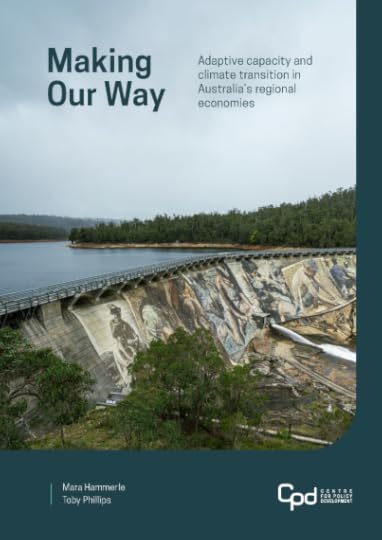
For example, while LGAs in NSW and Collie in WA benefit from dynamic local economies and strong domestic market connections that provide a good base to build upon with general business support, LGAs in the Pilbara and Central Queensland likely require more extensive planning and infrastructure investment due to their more highly-concentrated economies and fewer connections to nearby markets.
By leveraging the adaptive capacity framework, governments can better understand the specific strengths, needs and capabilities of local communities, and work with them to develop more effective and appropriate responses. This approach will increase economic diversity, build resilience and deliver investments that take communities where they want to go.
The report suggests that local transition plans should focus on fostering community resilience and adaptability rather than merely creating new anchor industries. Recommendations include building transition responses with local involvement, governments collaborating on all levels, local governments identifying community strengths and weaknesses, and state and federal governments providing funds, coordination, and policy frameworks.
The report, prepared after discussions with government officials and community leaders from eleven LGAs, serves as a roadmap for successful regional transition in the context of decarbonising the Australian economy.
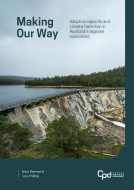 DOWNLOAD MAKING OUR WAY
DOWNLOAD MAKING OUR WAY
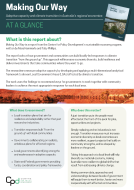 AT A GLANCE
AT A GLANCE
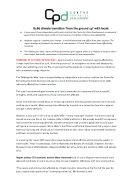 MEDIA RELEASE
MEDIA RELEASEThe post Making our way: Adaptive capacity and climate transition in Australia’s regional economies appeared first on Centre for Policy Development.
May 30, 2023
12th Meeting | Asia Dialogue on Forced Migration
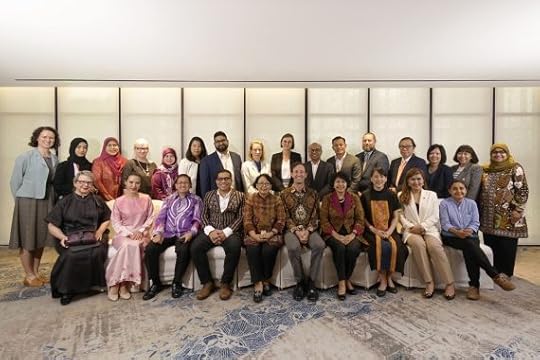
The Asia Dialogue on Forced Migration (ADFM) was delighted to convene its twelfth meeting in Jakarta on 16-17 May: the first to be held in person in more than three years. So much has changed since our last in person meeting in Dhaka, Bangladesh in February 2020, but we were delighted that participants remained engaged and invested in the format.
Our twelfth ADFM meeting came at a very important time for the region: a few months after the eighth Bali Process Ministerial Conference in Adelaide, one week after the first ASEAN Summit for 2023 in Labuan Bajo, and ahead of the second Global Refugee Forum in Geneva in December 2023.
The ADFM meeting considered the following themes:
ASEAN’s role in the management of forced migration: current activities and future potential;Strengthening the region’s response to the Rohingya displacement and ongoing boat movements;Policy and practice to improve the mental health of refugees in the region.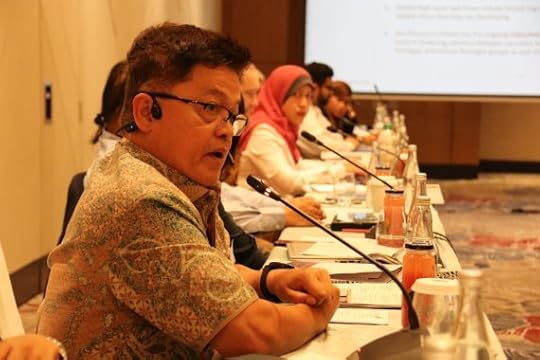
We elected to meet in Jakarta in order to capitalise on the momentum of Indonesia as the 2023 ASEAN Chair, under the slogan ASEAN Matters: Epicentrum of Growth. We were delighted that the Indonesian Ministry of Foreign Affairs hosted the ADFM Dinner on 16 May.
At the ADFM Dinner, Former Foreign Minister of Thailand, Khun Kasit Piromya shared his frank views with ADFM participants of where the region could do better in regional cooperation to support refugees and forced migrants, including the situation in Myanmar. In particular Khun Kasit highlighted the importance of Indonesian leadership in ASEAN, and the strength of past collaborations between Indonesia, Malaysia and Thailand.
Proposals developed during the meeting will now be further developed by the ADFM Secretariat over the coming weeks and advanced with relevant bodies. We look forward to working with participants as the proposals are advanced, and also to working towards another in person meeting in 2024.
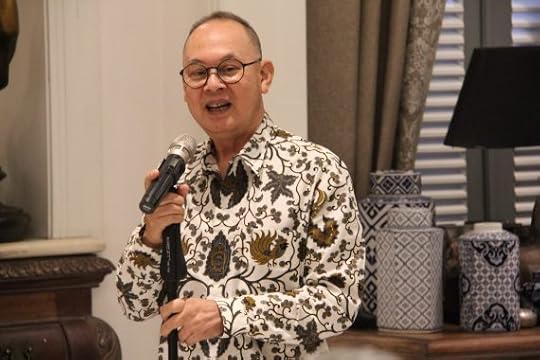
The ADFM was established in 2015 to incubate ideas and new approaches to more effective, durable and dignified approaches to forced migration in the Indo Pacific. At our twelfth meeting, participants attended in their personal capacity from eight countries, including two individuals from Myanmar academia & civil society.
Key DocumentsAgenda & Participant ListBriefing PapersParticipant Profiles More about the ADFM:Established in 2015, the Asia Dialogue on Forced Migration (ADFM) is an independent Track 1.5 forum for genuine dialogue on the critical forced migration issues facing the region. The ADFM has contributed to changes in governance, policy and practice benefiting refugees, stateless, and trafficked persons, in partnership with the region’s institutions and national governments.
The ADFM Secretariat is convened by CPD in Australia, in collaboration with partners there from the Indonesian National Research and Innovation Agency (BRIN), the Institute of Strategic and International Studies (ISIS) Malaysia and the Institute of Human Rights and Peace Studies. We are very grateful for their ongoing partnership and support of this work, which could only be achieved through this unique collaboration.
The ADFM has met nine times in person in capital cities around the Indo Pacific region. Our last in person meeting was in Dhaka, Bangladesh in February 2020, when the ADFM Secretariat made its second visit to Cox’s Bazar to follow up on our 2018 assessment of the risks of human trafficking and migrant smuggling arising out of the long-term displacement there. During the pandemic the ADFM continued to meet virtually, and also continued to advance the Regional Peer-Learning Platform on Alternatives to Child Detention.
The post 12th Meeting | Asia Dialogue on Forced Migration appeared first on Centre for Policy Development.
May 24, 2023
CPD SUPPORTS YES VOTE ON VOICE

The Uluru Statement from the Heart is a mirror to Australia saying,
“Look how much we’ve already done as a nation.”
It’s just time to bring it home.
– Professor Megan Davis, John Menadue Oration, 2020
The Centre for Policy Development (CPD) supports a Voice for Aboriginal and Torres Strait Islander people and supports a Yes vote in the 2023 referendum.
CPD’s work has repeatedly shown that public policy works best when all the voices of those experiencing the policy are heard in the process of its design and implementation.
The Voice is a key objective of the Uluru Statement from the Heart, along with a Makarrata Commission for truth-telling and agreement-making.
It has the support of Australia’s biggest First People’s democratically elected body, the First People’s Assembly of Victoria, as well as the Coalition of Aboriginal and Torres Strait Islander Peak Organisations in addition to countless Indigenous organisations, unions, business and sporting bodies.
We know Australia is capable of a response that meets the spirit of the Uluru Statement from the Heart. We believe that the referendum should and will have the support of the majority of Australians.
In 2020, Professor Megan Davis delivered CPD’s John Menadue Oration, on the question of “Can Australia Deliver?”
As a member of the Prime Minister’s Referendum Council, Professor Davis was instrumental in the development of the Uluru Statement From the Heart, one of the most important Australian documents since Federation.
Professor Davis said, “It’s important that constitutional reform for First Nations people is regarded as a discrete and serious issue of public policy, like climate change, banking regulation or superannuation.” She concluded by saying, “It’s just time to bring it home. ”
Our constitution was designed as a living document to incorporate changes on issues that go to the heart of our national identity and purpose as times change.
This year, Australia can choose to recognise Aboriginal and Torres Strait Islander people’s unbroken connection to Country according to the reckoning of Aboriginal culture, from the Creation, according to the common law from ‘time immemorial’, and according to science more than 60 millennia.
We can choose to embed a Voice for First Nations people in our nation’s foundational document.
We can choose to enrich our institutions with the knowledge, values and culture from 60,000 years of history.
This is a first step to fulfilling the vision of the Uluru Statement – of Voice, Treaty and Truth. To empower First Peoples to take their rightful place in a country where Aboriginal and Torres Strait Islander culture will be a gift to all Australians.
We must take this step to recognise our past, progress in the present, and create a future where we all flourish. In 2023, it’s just time to bring it home.
CPD understands that reconciliation with, and recognition of, First Peoples is a daily commitment. CPD is committed to undertaking this with humility and in conversation and relationship with First Peoples.
Learn more about the Yes campaign
The post CPD SUPPORTS YES VOTE ON VOICE appeared first on Centre for Policy Development.
May 9, 2023
MEDIA RELEASE: BUDGET TAKES KEY STEPS FORWARD, SYSTEMIC REFORMS NEEDED TO ACCELERATE PROGRESS
The 2023 Federal Budget delivers some key elements of long-term wellbeing for Australia and the region, but these must be accompanied by deeper systemic reforms to change the things that matter most to Australians.
Budget measures on early childhood, wellbeing, climate, regional engagement and people- and place-centred reform are welcome and necessary, but will not reach their potential without systemic reforms outside the budget – government is a question of “how”, not simply “how much”.
These include redesigning government service systems to meet the needs of people and communities, enhancing social infrastructure with a guarantee for young children and families, and an inclusive national goal-setting conversation to provide guidance to public decision-makers.
The importance of the early years is clear, with the budget investing in vital early childhood education and care for more families.
This social infrastructure would be aided by the removal of the activity test, which represents a barrier to participation and an impediment to the long-term social and economic benefits to our economy and society. CPD has long recommended universally accessible early childhood education and care, which is currently being considered by the Productivity Commission.
The Investment Dialogue for Australia’s Children, between the Commonwealth and the philanthropic sector, on place-based responses to entrenched disadvantage, further emphasises the importance of the early years.
This initiative, alongside the Stronger Places, Stronger People program and the Social Impact Outcomes Fund, represents a timely reconsideration of the hands-off model of outsourced service delivery that has dominated Commonwealth government for several decades. CPD applauds the collaborative mission-based, locally connected approach that is more in line with building long-term resilience and wellbeing.
Measures to address disadvantage and economic exclusion will be impaired by Jobseeker rates that still leave recipients in poverty despite the $40 per fortnight increase. They will also be impaired by an ineffective national employment service that currently fails to support people with barriers to work into decent sustainable jobs. This is critical to address through the current Workforce Australia Inquiry.
The budget recognises the urgent need to position Australia for a post-carbon future with the announcement of a Net Zero Authority to guide Australia’s climate transition – a key recommendation of CPD and partners in our sustainable economy work over the past decade.
This will unlock investment in renewable energy for swift, just and orderly transition, along with investment in emerging industries to support Australia’s prosperity in the coming decades. The announcement of the Hydrogen Headstart program will support the rapid development of a key post-carbon industry. This fund should aim to catalyse rather than compete with private capital, and to create green industry ecosystems that extend beyond hydrogen.
We are also encouraged that Australia’s diplomatic capability in DFAT has received much-needed support at a time when regional engagement is more important than ever.
The continued work within Treasury on the Measuring What Matters framework will aid future budgets in contributing to the long-term wellbeing of Australians.
An important next step will be for the government to go beyond measuring, and also align decision-making processes with what matters.
This national goal-setting, informed by involved and inclusive consultation about the Australia we want to hand on to future generations, and the values it represents, will assist governments in making difficult decisions and developing appropriate methods of tracking budget impact.
ENDS
The post MEDIA RELEASE: BUDGET TAKES KEY STEPS FORWARD, SYSTEMIC REFORMS NEEDED TO ACCELERATE PROGRESS appeared first on Centre for Policy Development.
April 18, 2023
Can a Wellbeing Economy Deliver? | John Menadue Oration by Sophie Howe | April 2023
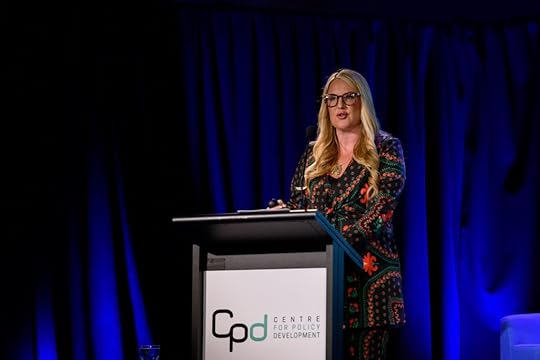 Photo: Ernesto Arriagada / @photosbyernesto 2023 John Menadue Oration by Sophie HoweCan a wellbeing economy deliver?
Photo: Ernesto Arriagada / @photosbyernesto 2023 John Menadue Oration by Sophie HoweCan a wellbeing economy deliver?The fourth instalment of CPD’s flagship event, named after our founding Chair John Menadue AO, was held in Melbourne on April 18, 2023, both in person at The Wheeler Centre and online via live stream.
As Australia pursues wellbeing in economic decision-making, the 2023 John Menadue Oration provided an audience with Sophie Howe, the inaugural Future Generations Commissioner of Wales.
Ms Howe delivered an insightful, engaging and informative speech entitled, ‘Can a Wellbeing Economy Deliver?’, where she candidly shared the lessons she learnt in working to embed a wellbeing approach in Wales and how those lessons are applicable in Australia to meet the long-term needs of people, communities and the environment.
Following the Oration, Ms Howe was joined in conversation by eminent Australian child wellbeing researcher and advocate Professor Fiona Stanley AC, moderated by CPD Chair Sam Mostyn AO.
Oration Transcript JOHN MENADUE ORATION 2023 SOPHIE HOWEINAUGURAL FUTURE GENERATIONS COMMISSIONER OF WALESWHEELER CENTRE, MELBOURNE AND ONLINE TUESDAY 18 APRIL 2023
CHECK AGAINST DELIVERY
SLIDE – PREDICTIONS FROM 1923 FOR 2023 – 4 HOUR DAY
I CAN OFFICIALLY DECLARE THAT YOU NO LONGER HAVE TO WORK HARD – JUST A MERE FOUR HOURS A DAY! RELAX, PUT UP YOUR FEET AND LET ELECTRICITY DO THE WORK – OR AT LEAST THAT’S WHAT THIS EXPERT DECLARED FOR 2023 BACK IN 1923.
SLIDE – PREDICTIONS FROM 1923 FOR 2023 – MEN AND WOMEN
WE SHOULD WORRY! GOD FORBID A MAN WITH CURLY HAIR AND WOMEN WITH SHAVED HEADS AND BLACK TEETH!
SLIDE – PREDICTIONS FROM 1923 FOR 2023 – LIVE TO 300
BUT AT LEAST WE’RE GOING TO LIVE TO BE 300 – WE’LL TAKE THE GOOD WITH THE BAD, RIGHT?
SLIDE 5 PREDICTIONS FROM 1923 FOR 2023 – UTENSILS MADE FROM PULP
MAYBE IT’S SOMETHING TO DO WITH THE UTENSILS MADE FROM PULP?
IT IS ALWAYS INTERESTING TO FIND OUT WHAT OUR ANCESTORS PREDICTED FOR TODAY, WITH THE LIMITED ACCESS TO THE KNOWLEDGE OF THE WORLD WE HAVE NOW.
THESE PREDICTIONS FOR 2023 MAY SOUND BIZARRE, BUT ALL OF THEM HAVE A PARTIAL TRUTH – OR AT LEAST AN UNDERSTANDING OF WHERE THE WORLD WOULD BE TODAY.
SLIDE – 2023 – HOW THE PREDICTIONS PLAYED OUT
BECAUSE, WE ARE INDEED, LIVING LONGER.
THE WAY WE WORK IS CHANGING, AND HAS CHANGED DRASTICALLY OVER THE LAST THREE YEARS, WITH MORE TO COME AS WE MOVE TO GREEN INDUSTRY. WE HAVE SHORTER WORKING WEEK PILOTS ACROSS THE WORLD WITH MUCH SUCCESS – IT MAY NOT BE FOUR HOURS A DAY, BUT IT’S A BIG CHANGE.
OUR USE OF MATERIALS HAVE CHANGED, AND THE MATERIALS WE USE FOR OUR UTENSILS TOO – WALES’ LEGISLATION TO BAN SINGLE USE PLASTICS FOR THINGS LIKE CUTLERY IS COMING INTO FORCE THIS YEAR.
THE WAY WE UNDERSTAND GENDER HAS CHANGED OVER THE PAST DECADE WITH OUR UNDERSTANDING OF GENDER AS A SOCIAL CONSTRUCT AND A WIDER UNDERSTANDING OF GENDER FLUIDITY.
SLIDE 7 – GLOBAL RISK REGISTER
OUR PREDICTIONS FOR THE FUTURE AREN’T QUITE AS BIZARRE OR AMUSING.
THE GLOBAL RISKS REPORT PREDICTS THE MOST LIKELY EVENTS TO CAUSE HAVOC IN OUR WORLD. IN 2006, THE FIRST ITERATION OF THE REPORT, RESEARCHERS FLAGGED THE ACUTE RISK OF AN INFLUENZA PANDEMIC TO OUR POPULATION AND THE IMPACT OF CLIMATE CHANGE ON OUR PLANET AND PEOPLE.
THESE ARE FINDINGS THAT APPEAR AGAIN AND AGAIN IN THE ANNUAL REPORT.
A DECADE AGO THE SAME RISKS WERE FLAGGED AND YET, WE WERE BLIND SIGHTED BY THE COVID-19 PANDEMIC, AND WE CONTINUE TO BE NONCHALANT IN THE FACE OF CLIMATE CHANGE; ALL SYMPTOMS OF SYSTEMS OF GOVERNMENTS ACROSS THE WORLD WHO ARE FAILING TO MAKE DECISIONS WITH THE FUTURE IN MIND.
SLIDE 8 – BRAIN SCIENCE
UNFORTUNATELY, WE ARE NOT HARD-WIRED TO THINK TO THE FUTURE.
STUDIES HAVE COME TO LIGHT THAT SHOW WHEN WE THINK OF OURSELVES IN THE FUTURE, OUR BRAINS FIRE UP IN A WAY THAT IT’S MORE SIMILAR TO WHEN WE ARE THINKING ABOUT A STRANGER. THE STUDIES SAY THAT WHEN YOU THINK ABOUT YOUR PRESENT SELF, THE MEDIAL PREFRONTAL CORTEX, A PART OF YOUR BRAIN, IS ACTIVATED.
IF YOU THEN THINK ABOUT SOMEONE ELSE, IT ‘POWERS DOWN’ SOMEWHAT. IF YOU ARE ASKED TO THINK ABOUT SOMEONE YOU DO NOT KNOW OR SOMEONE YOU DO NOT HAVE A CONNECTION WITH, THIS AREA IN YOUR BRAIN IS STIMULATED EVEN LESS.
HOWEVER, IT HAS BEEN FOUND THAT THE MORE DISTANT IN THE FUTURE YOU TRY TO VISUALISE YOURSELF, THE LESS ACTIVATED YOUR MEDIAL PREFRONTAL CORTEX BECOMES. ESSENTIALLY, THE BRAIN BEHAVES AS IF YOUR FUTURE SELF IS SOMEONE YOU DON’T HAVE A RELATIONSHIP WITH.
MAKES SENSE, RIGHT? I TELL MYSELF IT’S WHY I’M SO BAD AT PLANNING FOR RETIREMENT.
BUT THE WORLD IS IN CRISIS – A POLYCRISIS IN FACT, CAUGHT UP IN CONFLICT, POLARISATION FUELLED BY INCREASING WEALTH INEQUALITY, LIFE EXPECTANCY BEGINNING TO PLATEAU AND A PLANET ON THE BRINK OF IRREVERSIBLE DAMAGE.
SLIDE ON AUSTRALIA LIFE EXPECTANCY
SO WHAT LEGACY WILL WE LEAVE BEHIND TO FUTURE GENERATIONS – OUR CHILDREN GRANDCHILDREN AND THE MANY GENERATIONS AHEAD?
SLIDE – WORLD POPULATION PAST PRESENT AND FUTURE
IF WE LOOK 50, 000 YEARS TO THE PAST THERE HAVE BEEN AROUND 100 MILLION PEOPLE WHO WERE ALIVE AND ARE NOW DEAD.
CURRENTLY THERE ARE AROUND 8 BILLION PEOPLE LIVING ON PLANET EARTH. BUT IF WE LOOK 50,000 YEARS TO THE FUTURE, BASED ON CURRENT PROJECTIONS, THERE ARE AROUND 6.75 TRILLION PEOPLE WHO ARE YET TO BE BORN.
AND THE LIVES THEY LIVE WILL BE DETERMINED IN NO SMALL PART BY THE DECISIONS WE TAKE TODAY.
BECAUSE MANY OF THE CHALLENGES THEY WILL FACE WE KNOW ABOUT TODAY – JUST AS MANY OF OUR PREDECESSORS KNOWINGLY STORED UP THE PROBLEMS WE NOW FACE.
IN TERMS OF CLIMATE FOR EXAMPLE WE HAVE PUT MORE CARBON INTO THE ATMOSPHERE SINCE THE UN PUBLISHED THEIR FIRST FRAMEWORK FOR ACTION ON CLIMATE CHANGE IN 1992 AND SINCE AL GORE RELEASED THE FIRST VERSION OF AN INCONVENIENT TRUTH THAN AT ANY OTHER TIME DURING HUMAN HISTORY.
WE’VE DONE THE DAMAGE KNOWINGLY, OR IF YOU WANT TO PUT IT MORE POLITELY WE HAVE BEEN WILLFULLY BLIND – WILLFULLY IGNORANT – BECAUSE THE ACTION THAT WE NEED TO TAKE IF WE CHOOSE TO SEE IS, WELL, TOO INCONVENIENT.
AND WHEN I SAY WE – OF COURSE OUR INDIVIDUAL BEHAVIOURS ALL ADD UP TO THE PROBLEMS WE NOW SEE – BUT LETS BE HONEST, THE ‘WE’ IS REALLY ABOUT A SMALL NUMBER OF POLITICIANS AND CORPORATE GIANTS WHO HAVE PUT PROFIT OVER PLANET.
AND AS A MUM OF MY OWN FIVE FUTURE GENERATIONS INCLUDING THREE TEENS I’VE GOT INTO A BIT OF HIP HOP RECENTLY AND ACTUALLY IF YOU LISTEN TO SOME OF THE LYRICS THESE KIDS ARE CALLING US OUT.
SLIDE – LOYALE CARNER
BRITISH ARTIST LOYALE CARNER HITS THE NAIL ON THE HEAD WHEN HE SAYS “NEVER HAS SO MUCH BEEN LOST BY SO MANY BECAUSE OF THE INDECISION OF SO FEW”.
BUT MAYBE OUR YOUNGER GENERATIONS ARE COMING FULL CIRCLE BECAUSE OUR ANCESTORS IN SOME CASES, MOSTLY IN RESPECT OF INDIGENOUS PEOPLES ALSO ARE MUCH BETTER AT DEPLOYING THE LONGER TERM THINKING WE NEED.
TAKE THE IROQUIS WHO ARE FAMOUS FOR THEIR SEVEN GENERATION THINKING OR THE WISDOM HERE OF ABORGINAL ELDERS.
FOR TOO LONG THE WISDOM OF INDIGENOUS PEOPLE AND OF SMALL NATIONS HAS BEEN FORGOTTEN OR IGNORED.
LOOK TO BHUTAN WHO MEASURE ALL THEIR DECISIONS AGAINST A GROSS HAPPINESS INDEX. WHERE THEY HAVE RECORDED AN AVERAGE GROWTH IN ANNUAL GDP OF 7.5% SINCE THE EARLY 1980S, POVERTY LEVELS HAVE DECLINED FROM 36% TO 10% AND THEY ARE THE ONLY CARBON NEGATIVE COUNTRY IN THE WORLD.
TAKE FINLAND, ICELAND, SCOTLAND AND YOUR NEIGHBOURS NEW ZEALAND WHO ARE ALL MOVING BEYOND GDP TO MEASURE DECISIONS ON THE BASIS OF PLANETARY AND HUMAN WELLBEING.
AND TAKE WALES – KNOWN AS THE LAND OF SONG, OF LANGUAGE AND CULTURE, FOR TOM JONES AND GARETH BALE, AS THE ORIGINAL HOME OF YOUR FORMER PRIME MINISTER JULIA GILLARD AND FOR OCCASIONALLY BEATING YOU AT RUGBY.
BUT ALSO WE WERE KNOWN FOR BEING AT THE FOREFRONT OF THE COAL TRADE WHERE IN OUR CAPITAL, THE FIRST £1 MILLION CHEQUE FOR COAL WAS SIGNED.
SLIDE COAL EXCHANGE THEN AND NOW
BUT NOW WE WANT TO BE KNOWN AS A COUNTRY AT THE FOREFRONT OF THE WELLBEING REVOLUTION – A COUNTRY WHICH PUTS THE WELLBEING OF PEOPLE OF PLANET AND OF OUR FUTURE GENERATIONS AT THE FOREFRONT OF OUR DECISION MAKING.
AND IN 2015 WALES BECAME THE FIRST COUNTRY IN THE WORLD TO LEGISLATE TO DO THAT.
SLIDE – THE ACT
SO WHAT DOES THAT LEGISLATION DO?
FIRST OF ALL IT REQUIRES ALL OF OUR MAIN PUBLIC INSTITUTIONS – OUR LOCAL AUTHORITIES OUR HEALTH BOARDS OUR NATIONAL INSTITUTIONS LIKE OUR PUBLIC HEALTH AND ENVIRONMENT AGENCIES AND SIGNIFICANTLY OUR GOVERNMENT TO DEMONSTRATE HOW THEY ARE MEETING TODAY’S NEEDS WITHOUT COMPROMISING THE ABILITY OF FUTURE GENERATIONS TO MEET THEIR OWN NEEDS?
SLIDE – WELLBEING GOALS
IT THEN SETS OUT SEVEN LONG TERM WELLBEING GOALS, DEVISED IN CONVERSATION WITH THE CITIZENS OF WALES – A NATIONAL CONVERSATION CALLED ‘THE WALES WE WANT’ WHERE OVER 10,000 CITIZENS GAVE THEIR VIEWS ON THE WALES THEY WANTED TO LEAVE BEHIND TO THEIR CHILDREN, THEIR GRANDCHILDREN AND FUTURE GENERATIONS TO COME.
AND THEY TOLD US THAT THEY WANTED TO PROTECT OUR NATURAL ASSETS FOR THE NEXT GENERATION, THAT FAIRNESS AND COMMUNITY WERE IMPORTANT, THAT OUR LANGUAGE, CULTURE AND HERITAGE WAS SOMETHING THAT WE NEEDED TO PASS ON. AND SO THESE WERE EMBEDDED IN SEVEN LONG TERMS GOALS LINKED BACK TO THE UN SDGS.
NOTE HERE SPECIFICALLY THE GOAL OF A ‘MORE PROSPEROUS WALES’ AND PICK OUT THE KEY WORDS
INNOVATIVEPRODUCTIVELOW CARBONRECOGNISING THE LIMITS OF THE GLOBAL ENVIRONMENTUSES RESOURCES EFFICIENTLY AND PROPORTIONATELY, INCLUDING ACTING ON CLIMATE CHANGEWHICH DEVELOPS A SKILLED POPULATIONWITH OPPORTUNITIES FOR DECENT WORKAND THE DUTIES ON ALL THE PUBLIC BODIES COVERED BY THE ACT ARE
TO SET OBJECTIVES TO MAXIMISE THEIR CONTRIBUTION TO THE GOALSTO TAKE ALL REASONABLE STEPS TO DELIVER THESE OBJECTIVES NOT ONLY IN THE WAY THEY DEVELOP POLICY AND SERVICES, BUT IN HOW THEY DEPLOY THEIR BUDGET, HOW THEY PROCURE, HOW THEY PLAN AND DEVELOP ASSETS, MANAGE RISK, AND PLAN THEIR WORKFORCE.
SLIDE – COMMISSIONER GENERAL DUTIES
SOUNDS DIFFICULT SO FAR?
WELL THE ACT ESTABLISHES AN INDEPENDENT COMMISSIONER TO OVERSEE THE CHANGE. TO ADVISE AND SUPPORT THESE BODIES ON THE STEPS THEY SHOULD TAKE AND TO MONITOR THEIR PROGRESS. THE ROLE OF COACH AND REFEREE IF YOU LIKE AND I CAN TELL YOU THAT IS QUITE A FINE BALANCE TO STRIKE.
SLIDE – COMMISSIONER SPECIFIC POWERS
THE ACT DOES NOT GIVE THE COMMISSIONER THE POWER TO STOP ANYONE DOING ANYTHING OR FORCE ANYONE TO DO ANYTHING BUT INSTEAD ESTABLISHES THE COMMISSIONER AS THE GUARDIAN OF THE INTERESTS OF FUTURE GENERATIONS. THE VOICE OR CONSCIENCE WHO AS I DESCRIBE WILL ‘CALL OUT THE MADNESS OF SHORT-TERM DECISION MAKING WHICH DISREGARDS THOSE YET TO BE BORN’.
BUT ALSO IN MY EXPERIENCE TO DEPLOY A RANGE OF TACTICS TO BUILD A MOVEMENT FOR CHANGE IN WALES.
INSPIRING NEW AND PROGRESSIVE POLICY AND ACTION,BEING THE FIGUREHEAD FOR THOSE WHO DARE TO THINK THE IMPOSSIBLE IS POSSIBLE,HOLDING THE HANDS OF THE TRIERS BREAKING DOWN THE BARRIERS THEY EXPERIENCECONVENING POTENTIAL PARTNERSBANGING HEADS TOGETHER,USING THE PUBLIC PLATFORM TO SPEAK OUTUSING REVIEW POWERS AND MUCH MOREBECAUSE ALTHOUGH THIS IS A LAW, ESSENTIALLY IT IS THE BIGGEST CULTURAL CHANGE PROGRAM WALES (AND I’D ARGUE POSSIBLY ANY COUNTRY) HAS EVER SEEN.
AND SO FINALLY THE ACT SETS OUT A TOOLKIT FOR THE WAYS OUR INSTITUTIONS SHOULD CHANGE THE WAYS THEY WORK TO ACHIEVE THESE GOALS WITH POWERS FOR THE AUDITOR GENERAL TO AUDIT HOW THESE WAYS OF WORKING ARE BEING APPLIED.
AND HERE YOU CAN SEE THE ARCHITECTURE OF THE ACT.
SLIDE – WAYS OF WORKING
FIRSTLY THEY MUST CONSIDER THE LONG TERM. WHAT WOULD THE LONG-TERM IMPACT BE OF THE THINGS THEY DECIDE TO DO?
THEY SHOULD USE FUTURE TRENDS AND SCENARIOS INCLUDING THE FUTURE TRENDS FOR WALES REPORT THAT THE WELSH GOVERNMENT PUBLISHES EVERY TWO YEARS.
THEY MUST SEEK TO PREVENT PROBLEMS FROM OCCURRING OR FROM GETTING WORSE.
AN ATTEMPT TO SHIFT FROM PARKING OUR AMBULANCE AT THE BOTTOM OF A THE RIVER AND PULLING SOMEONE OUT WHEN THEY’RE DROWNING TO GETTING UPSTREAM AND PREVENTING THEM FALLING IN THE RIVER IN THE FIRST PLACE.
THEY MUST INVOLVE CITIZENS IN FINDING SOLUTIONS – NOTE THAT THIS WORD “INVOLVE” IS DIFFERENT TO “CONSULT” OR “ENGAGE” AND TAKES US TO A DEEPER LEVEL BASED ON CO-PRODUCTION.
THEY MUST COLLABORATE. WORK TOGETHER BETWEEN EACH OTHER BUT ALSO WITH THE PRIVATE AND VOLUNTARY SECTORS, WITH HOUSING ASSOCIATIONS AND FURTHER AND HIGHER EDUCATION, RECOGNISING THAT NO ONE BODY CAN MEET THE CHALLENGES OF SEIZING THE OPPORTUNITIES FOR MEETING OUR WELLBEING GOALS ALONE.
THE ACT ALSO SETS UP SOME SPECIFIC MECHANISMS FOR THIS TO HAPPEN THROUGH THE ESTABLISHMENT OF PUBLIC SERVICES BOARDS – A STATUTORY BOARD MADE UP OF ALL THE KEY PUBLIC SERVICES IN EACH LOCAL AUTHORITY AREA OR REGION.
THEY MUST INTEGRATE THEIR ACTION. RECOGNISE THE CONNECTIONS BETWEEN THE GOALS AND POLICY AREAS AND SERVICES. IF WE WANT TO MEET OUR GOAL OF PROSPERITY WE HAVE TO MAKE SURE THAT WE TAKE STEPS TO BOTH PROTECT AGAINST THE ECONOMIC IMPACT OF CLIMATE CHANGE BUT ALSO JOIN THE DOTS TO TAKE ADVANTAGE TO THE GREEN REVOLUTION TO DEVELOP THE HIGH QUALITY GREEN JOBS OF THE FUTURE.
BECAUSE THERE ARE NO JOBS ON A DEAD PLANET BUT THERE ARE HIGH QUALITY JOBS WHICH CAN ADDRESS POVERTY, REDUCE INEQUALITY AND IMPROVE HEALTH, THAT ARE NEEDED TO DELIVER NET ZERO.
WHATEVER POINT, ISSUE OR POLICY YOU START FROM IT IS MAKING THE LONG-TERM CONNECTIONS WHICH DELIVERS THE WELLBEING MAGIC. IF WE TAKE HEALTH FOR EXAMPLE.
IN PREVIOUS TIMES WE MIGHT HAVE SET A GOAL OF A HEALTHIER WALES – WHO DOESN’T WANT A HEALTHIER POPULATION? WE WOULD HAVE QUICKLY SENT THAT TASK OFF TO OUR MUCH LOVED NATIONAL HEALTH SERVICE TO DELIVER. MAKES SENSE RIGHT? HEALTH SERVICE DELIVERS HEALTH OF A NATION?
WRONG.
THE BIGGEST DETERMINANTS OF THE HEALTH OF THE NATION ACTUALLY HAVE VERY LITTLE TO DO WITH WHAT THE HEALTHCARE SYSTEM ITSELF DOES. IN FACT IN MANY CASES THE SYSTEM ITSELF IS A MAIN CONTRIBUTOR TO THE PROBLEMS WHICH CAUSE ILL HEALTH. TAKE THE FACT THAT IF THE HEALTHCARE SYSTEMS GLOBALLY WERE A COUNTRY IT WOULD BE THE FIFTH BIGGEST EMITTER IN THE WORLD – BUT THAT’S FOR ANOTHER LECTURE.
SLIDE – WHO SOCIAL DETERMINANTS OF HEALTH
BUT IF WE LOOK AT THE WHAT THE WORLD HEALTH ORGANISATION TELLS US ARE THE BIGGEST FACTORS WHICH AFFECT OUR HEALTH THEY’RE ACTUALLY MOSTLY NOTHING TO DO WITH THE HEALTHCARE SYSTEM ITSELF.
35 PERCENT OF WHAT MAKES A DIFFERENCE TO LEVELS OF LIFE EXPECTANCY IS ABOUT INCOME SECURITY.
29 PERCENT IS ABOUT LIVING CONDITIONS – THE QUALITY OF OUR HOMES, WHETHER WE LIVE IN AREAS OF HIGH AIR POLLUTION. DO WE HAVE ACCESS TO NATURE? THIS CONCEPT OF US ALL WANTING TO LIVE IN THE LEAFY SUBURBS ACTUALLY HAS SUBSTANCE BECAUSE IT HAS A DIRECT CORRELATION TO OUR HEALTH.
AND WHAT’S REALLY INTERESTING BUT ALSO OBVIOUS IN MANY WAYS IS THAT 19 PERCENT IS ABOUT SOCIAL AND HUMAN CAPITAL. WHAT ARE THE QUALITY OF OUR CONNECTIONS AND RELATIONSHIPS? DO WE HAVE PEOPLE WE CAN TURN TO? IS THERE A SENSE OF COMMUNITY IN THE PLACE WE LIVE AND DO WE FEEL WE HAVE AGENCY IN THAT COMMUNITY?
FOR MANY POLITICIANS AND POLICYMAKERS THIS HAS BEEN THE SOFT AND FLUFFY STUFF, THE STUFF THE STATE DOESN’T HAVE A ROLE IN. BUT ACTUALLY FAR FROM BEING SOFT AND FLUFFY IT RELATES BACK TO THE HARDCORE METRIC OF “HOW LONG WILL WE LIVE?”
SLIDE – WELLBEING SWEET SPOT
AND SO WHAT WE ARE TRYING TO DO WITH THIS APPROACH IS CONNECT THE DOTS AND FIND THE SWEET SPOTS THAT DELIVER WELLBEING. TO RECOGNISE AND RESPOND TO THOSE CONNECTIONS IN OUR POLICY MAKING AND DELIVERY OF PUBLIC SERVICES.
IT’S WHY MONMOUTH COUNCIL IN SOUTH WALES BECAME THE FIRST PUBLIC INSTITUTION TO TAKE ON THE RUNNING OF A POST OFFICE TO STOP THAT COMMUNITY FACILITY LEAVING THE AREA AND BREAKING DOWN THAT COMMUNITY’S SPACE TO CONNECT.
IT’S WHY A REPRESENTATIVE FROM OUR ENVIRONMENT AGENCY WHO SITS ON THE BLAENAU GWENT PUBLIC SERVICES BOARD COULD DESCRIBE TO ME WHEN I VISITED THE ROLE HIS ORGANISATION COULD PLAY IN TACKLING ADVERSE CHILDHOOD EXPERIENCES.
IT’S THE THING THAT ELUDES GOVERNMENTS PUBLIC INSTITUTIONS AND ALMOST EVERY ORGANISATION IN THE WORLD – THE REMOVAL OF SILOS AND THE COMING TOGETHER BEYOND BOUNDARIES TO DELIVER WELLBEING FOR ALL.
SO HOW MIGHT THIS PLAY OUT IN A LIVE POLICY ISSUE? LET’S TAKE A PROBLEM WHICH MOST COUNTRIES IN THE WORLD ARE GRAPPLING WITH IN ONE SHAPE OR FORM.
HOW DO WE ENSURE OUR TRANSPORT SYSTEMS ARE FIT FOR THE FUTURE? IN PARTICULAR HOW DO WE REDUCE OUR CARBON EMISSIONS FROM TRANSPORT IN LINE WITH MEETING OUR CLIMATE TARGETS?
AND HERE I FIND THIS APPROACH USING THREE HORIZONS USEFUL.
SLIDE – 3 HORIZONS
HORIZON ONE. WHAT WILL HAPPEN IF WE CARRY ON WITH BUSINESS AS USUAL? WELL WE’D BE ON A DOWNWARD TRAJECTORY – NOT MEETING CLIMATE TARGETS AND SO ON.
HORIZON THREE IS WHERE WE WANT TO BE – THE NEW NORMAL WE WANT TO CREATE. AND THIS IS THE IMPORTANT BIT IN WALES – WE KNOW WHAT THAT IS – NOT THE CASE FOR MOST OTHER COUNTRIES WHERE THERE IS NO CITIZEN DEVELOPED AND LEGALLY AGREED VISION. AND WE KNOW THAT WHENEVER WE’RE SEARCHING FOR POLICY SOLUTIONS WE NEED THOSE SOLUTIONS TO MAXIMISE ALL ASPECTS OF WELLBEING.
AND HORIZON TWO. WHAT ARE THE THINGS WE NEED TO DO TO OR WHAT ARE THE INNOVATIONS IN PLAY THAT WILL GET US TO HORIZON THREE?
AND HERE’S THE TRICK. THE THINGS YOU MIGHT DO TO SOLVE ONE PROBLEM MIGHT NOT BE THE THINGS YOU SHOULD DO IF YOU’RE SEEKING TO IMPROVE WELLBEING OVERALL.
IN FACT THEY MAY JUST TAKE YOU BACK TO REINFORCING BUSINESS AS USUAL.
HORIZON TWO: IF YOU JUST WANTED TO DECARBONISE A TRANSPORT SYSTEM THEN MASS INVESTMENT IN ELECTRIC VEHICLES MIGHT BE THE ANSWER.
THE PROBLEM IS THAT:
EVS STILL HAVE AN ENVIRONMENTAL IMPACT IN THEIR PRODUCTIONIT MEANS THAT WE ARE ALL STILL SAT IN TRAFFIC CONGESTION IN OUR EVS RATHER THAN OUR PETROL CARSWE’RE ALL STILL GETTING FATTER BY DOING SO ADDING TO THE LOOMING OBESITY CRISISWE’RE ALL STILL THERE NOT CONNECTING WITH OUR COMMUNITYPOORER PEOPLE WHO COULDN’T AFFORD PETROL CARS DEFINITELY CAN’T AFFORD EVS EVEN WITH A GRANTSO WHEN YOU APPLY A HOLISTIC WELLBEING LENSE THEN YOU FIND THAT EVS ARE ACTUALLY NOT THE ANSWER AT ALL.
A MUCH BETTER SOLUTION FOR ENVIRONMENT, EQUALITY, COMMUNITY AND HEALTH IS TO INVEST IN WALKING, CYCLING AND PUBLIC TRANSPORT.
WHICH IS EXACTLY WHAT A HARD FOUGHT BATTLE USING THE FUTURE GENERATIONS ACT MEANS WE ARE DOING IN WALES.
SLIDE – M4
TRANSPORT BECAME THE FIRST TEST OF THE ACT. SPECIFICALLY GOVERNMENT PROPOSALS TO SPEND AROUND £1.5 BILLION BUILDING A 13-MILE STRETCH OF MOTORWAY TO DEAL WITH A PROBLEM OF CONGESTION ON THE M4 AROUND NEWPORT.
THE FUNDING EQUATED TO THE ENTIRE OF THE WELSH GOVERNMENT’S BORROWING CAPACITY AND THE ROUTE WENT THROUGH A NATURE RESERVE. IT WAS ARGUED THAT IT WAS A NECESSARY PIECE OF INFRASTRUCTURE FOR WALES’ ECONOMY.
AS COMMISSIONER I INTERVENED IN THIS DECISION AND ASKED THE GOVERNMENT TO EXPLAIN TO ME HOW THEY HAD APPLIED THE FUTURE GENERATIONS ACT.
HOW IT WAS IN LINE WITH THE GOAL OF A PROSPEROUS WALES WHICH TALKS ABOUT PROSPERITY WITHIN THE CONTEXT OF ACTING ON CLIMATE CHANGE?HOW IT MET THE GOAL OF A RESILIENT WALES WHEN IT WOULD PERMANENTLY DAMAGE THE BIODIVERSITY OF THE AREA?HOW IT WAS IN LINE WITH THE GOAL OF A HEALTHIER WALES WITH RISING LEVELS OF AIR POLLUTION AND OBESITY?HOW IT WAS IN LINE WITH THE GOAL OF A MORE EQUAL WALES WHEN 25 PERCENT OF THE LOWEST INCOME FAMILIES IN THE AREA DON’T EVEN OWN A CAR? SO WE’D ESSENTIALLY BE SPENDING THE ENTIRE OF THE BORROWING CAPACITY ON A SCHEME THAT ONLY BENEFITED THE ALREADY BETTER OFFTHE GOVERNMENT FOUND IT HARD TO ANSWER THESE QUESTIONS AND CONSEQUENTLY AND AGAINST ALL EXPECTATIONS THE FIRST MINISTER REVERSED THE DECISION, CANCELLED THE ROAD AND SET UP A COMMISSION TO LOOK AT ALTERNATIVE OPTIONS WHICH ALIGNED WITH THE FUTURE GENERATIONS ACT.
THE GOVERNMENT IS NOW PLANNING TO SPEND HALF THE MONEY IMPROVING PUBLIC TRANSPORT AND ACTIVE TRAVEL ROUTES IN THE AREA.
SLIDE – TRANSPORT AS AN EXAMPLE OF THREE HORIZONS
IT DIDN’T STOP THERE. THESE INTERVENTIONS AND MY ONGOING CHALLENGE TO GOVERNMENT ABOUT HOW THEY WERE SPENDING CAPITAL INFRASTRUCTURE INVESTMENT, HOW THEIR POLICIES WERE ACCOUNTING FOR THE LONG TERM AND AND APPLYING WELLBEING HOLISTICALLY LED TO:
A TOTALLY NEW TRANSPORT STRATEGY PRIORITISING ACTIVE TRAVEL AS A TRANSPORT SOLUTION AND PUTTING PRIVATE CAR USE AT THE BOTTOM OF THE TRANSPORT HIERARCHYA SHIFT IN INFRASTRUCTURE INVESTMENT. WE WERE PREVIOUSLY SPENDING TWO THIRDS OF OUR INFRASTRUCTURE BUDGET ON BUILDING ROADS AND IN THE LAST BUDGET ROUND THIS WENT DOWN TO ONE THIRD, WITH NEW INVESTMENT INTO PUBLIC TRANSPORT AND ACTIVE TRAVELA MORATORIUM ON ROAD BUILDING WITH 55 NEW ROAD SCHEMES ACROSS WALES HALTED AND REVIEWED IN LINE WITH THE FUTURE GENERATIONS ACTTHE ROLLOUT OF A STANDARDISED 20MPH SPEED LIMIT IN ALL RESIDENTIAL AREAS ACROSS WALESAND INNOVATIVE TRIALS FROM ELECTRIC BIKE LOAN SCHEMES TO BUSES ON DEMAND TO CLOSING SCHOOL STREETS TO TRAFFICSO A MAJOR TRANSFORMATION IN TRANSPORT BUT WHAT ELSE HAS CHANGED?
SLIDE – HEALTH
IN HEALTH WE’RE SEEING ENCOURAGING STEPS TOWARDS JOINED UP PREVENTION:
DOCTORS ISSUING FREE BIKE HIRE ON PRESCRIPTIONCOMMUNITY WELLBEING HUBS FOCUSING ON TACKLING THE WIDER DETERMINANTS OF PHYSICAL AND MENTAL HEALTHTHE FIRST HOSPITAL-BASED SOLAR FARM IN THE UKA HOSPITAL SITE WHICH DECIDED NOT TO SELL SURPLUS LAND FOR DEVELOPMENT BUT INSTEAD TO DEVELOP IT FOR THE COMMUNITY WITH FOOD GROWING LAND MANAGEMENT SKILLS PROGRAM SPACE FOR RESTORING AND CONNECTING WITH NATURESLIDE – UBI
AND PERHAPS ONE OF THE BIGGEST STEPS IS THE FIRST GOVERNMENT BACKED PILOT OF UNIVERSAL BASIC INCOME IN THE UK.
BACK TO THOSE WIDER DETERMINANTS – WE KNOW THAT POVERTY COSTS THE UK HEALTHCARE SYSTEM £29 BILLION EVERY YEAR.
MY REPORT SAID WALES INTRODUCING A UNIVERSAL BASIC INCOME COULD HALVE POVERTY.
JUST A FEW YEARS AGO IT WAS CONSIDERED IMPOSSIBLE, BUT LAST YEAR THE WELSH GOVERNMENT LAUNCHED THEIR FIRST TRIAL, INITIALLY TARGETED TOWARDS YOUNG PEOPLE LEAVING THE STATE CARE SYSTEM, WHO ARE NOW RECEIVING AN UNCONDITIONAL INCOME OF £1600 PER MONTH WITH A BIG EVALUATION WRAPPED AROUND IT.
SLIDE – REDUCING WASTE
WHEN DOES REDUCING WASTE ALSO HELP TO TACKLE LONELINESS?
WHEN A HOLISTIC WELLBEING APPROACH IS APPLIED.
WALES HAS A STRONG TRACK RECORD ON WASTE. WE ARE THIRD IN THE WORLD FOR OUR RATES OF RECYCLING BUT IN LINE WITH OUR WELLBEING GOALS WE HAVE SET AN ASPIRATION TO BE A ZERO WASTE BY 2050.
BUT WE WANT TO DO THAT IN A WAY WHICH ALSO REDUCES POVERTY, BRINGS COMMUNITIES TOGETHER AND SO ON.
SLIDE – BENEFITS OF WELLBEING APPROACH TO WASTE
SO WE’VE SET UP COMMUNITY REPAIR SHOPS WHERE PEOPLE CAN INTEGRATE WHILST GETTING THEIR PHONE, TELEVISION OR WHATEVER REPAIRED BY VOLUNTEERS. THE LIBRARY OF THINGS – WHERE YOU CAN BORROW ANYTHING FROM A TENT TO A LAWNMOWER. SCHOOL UNIFORM SWAP SHOPS SO HARD UP PARENTS DON’T NEED TO SPEND HUNDREDS OF POUNDS KITTING THEIR CHILDREN OUT FOR THE SCHOOL YEAR BUT INSTEAD CAN REUSE THE UNIFORM FROM KIDS IN THE YEAR ABOVE FOR THE COST OF A FEW POUNDS, RAISING FUNDS FOR THE SCHOOL AND KEEPING WASTE FROM LANDFILL.
SLIDE – EDUCATION
AND OF COURSE EDUCATION – ARGUABLY THE MOST IMPORTANT LONG TERM INTERVENTION WE CAN MAKE.
A NEW CURRICULUM IN WALES CENTRED AROUND THE WELLBEING GOALS WITH THE AIM TO PREPARE AND EQUIP CHILDREN NOT JUST FOR THE JOBS OF THE FUTURE BUT FOR A LIFE WELL LIVED.
AMBITIOUS AND CAPABLE LEARNERS – WITH A LUST FOR LIFELONG LEARNINGENTERPRISING AND CREATIVE CONTRIBUTORS – RECOGNISING THE IMPORTANCE OF CREATIVITY AS A KEY SKILL FOR THE FUTUREHEALTHY AND CONFIDENT INDIVIDUALS – RECOGNISING THAT AS A SOCIETY OUR PHYSICAL AND MENTAL HEALTH IS AS IMPORTANT AS OUR ECONOMIC OUTPUTAND FINALLY ETHICAL AND INFORMED CITIZENS – WHAT IF EVERYONE ONE OF US IN THIS ROOM, IN GOVERNMENT IN PUBLIC POLICY HAD BEEN THROUGH AN EDUCATION SYSTEM WHICH TAUGHT THEM TO BE ETHICAL AND INFORMED CITIZENS? WOULD WE BE LIVING IN A CLIMATE EMERGENCY? WOULD WE BE SEEING WEALTH INEQUALITY RISING?I COULD TELL YOU MORE ABOUT THE GOOD THINGS THE CHAMPIONS WHO ARE USING THE ACT TO CHANGE THE WAY THEY PROCURE, THE DOCTORS WHO ARE REFORMING CITY TRANSPORT STRATEGIES, THE ENGINEERS WHO ARE GREENING OUR CITIES AND THE ECONOMIC AGENCIES WHO ARE FOCUSED ON SUSTAINABLE FOOD CHAINS.
BUT I CAN ALSO TELL YOU IT HAS NOT BEEN EASY AND WE STILL HAVE A HUGE AMOUNT OF WORK DO.
IT IS NOT ENOUGH TO HAVE A FRAMEWORK FOR PEOPLE TO FOLLOW EVEN IF IT’S A LEGISLATIVE ONE BECAUSE HUMAN NATURE DOESN’T LIKE CHANGE AND YOU WILL FIND THAT WITHOUT STRONG OVERSIGHT, SUPPORTIVE AND CHALLENGING INTERVENTIONS, THAT THE SYSTEM WON’T ACTUALLY CHANGE WHAT IT DOES. IT WILL JUST USE THE NEW WELLBEING WORDS TO DESCRIBE IT.
A FRAMEWORK WHICH SITS AS THE RESPONSIBILITY OF ONE MINISTER OR ONE ORGANISATION HAS A CHANCE OF CHANGING ‘A’ RULE OF THE GAME BUT WON’T CHANGE THE GAME ITSELF.
WE HAVE LEARNT THE LESSONS HERE. UNLESS IT’S EVERYONE’S BUSINESS AND BECOMES THE OVERARCHING AND UNDERPINNING FRAMEWORK FOR EVERYTHING A COUNTRY DOES THEN IT WILL GET LOST WHENEVER THE NEXT POLITICAL INITIATIVE COMES ALONG.
WE HAVE ALSO LEARNT THAT THIS NEEDS SYSTEM- WIDE REFORM. AT THE BEGINNING OF OUR JOURNEY THIS NEW APPROACH WAS ALL WELL AND GOOD BUT NOTHING ELSE ALIGNED WITH IT.
YES THE ACT WAS AN ALL ENCOMPASSING FRAMEWORK BUT IF YOU LOOKED TO THE VARIOUS STRATEGIES PLANS AND REGULATIONS THEY WERE AT ODDS WITH IT.
MAKE LONG TERM PLANS WE SAID, AND HERE’S YOUR BUDGET FOR A YEARWORK TOGETHER WE SAID, BUT THE SYSTEMS OF GOVERNANCE WILL STILL HOLD JUST ONE OF YOU ACCOUNTABLEPREVENT PROBLEMS WE SAID, BUT WE’RE STILL GOING TO HOLD YOU TO ACCOUNT PRIMARILY AND INTENSIVELY ON SHORT TERM PERFORMANCE MEASURESINVOLVE CITIZENS WE SAID, BUT AUSTERITY MEASURES HAVE STRIPPED AWAY ALL THE RESOURCES YOU MIGHT HAVE HAD FOR DOING THISTAKE RISKS AND TRY NEW THINGS WE SAID, BUT WE’LL STILL CRUCIFY YOU IN AUDIT IF YOU GET IT WRONGSO WE’VE HAD TO REBUILD OR CONSTRUCT FROM SCRATCH NEW WAYS FOR THE WHOLE SYSTEM AND THAT IS STILL A WORK IN PROGRESS.
AND SO THERE ARE A LOT OF BARRIERS AND THIS LINKS TO ONE OF THE OTHER THINGS WE’VE LEARNT – THE NEED TO TURN A PIECE OF LEGISLATION BEYOND ITS PROCESS AND BUREAUCRATIC REQUIREMENTS INTO SOMETHING INSPIRING.
TO FIND THE PEOPLE IN THE SYSTEM – I CALL THEM THE FRUSTRATED CHAMPIONS – WHO FOR A LONG TIME HAVE BEEN ABLE TO SEE THERE’S A BETTER WAY OF DOING THINGS BUT THE SYSTEM HAS FRUSTRATED THEM.
BECAUSE THESE ARE THE PEOPLE WHO HAVE BEEN WAITING FOR SOMETHING LIKE THIS AND WILL BECOME THE FIRST TO USE IT TO DO DIFFERENT THINGS, TO CHALLENGE THE SYSTEM AND WALK A PATH TO THE NEW NORMAL.
THE BEST WAY TO PREPARE FOR THE FUTURE IS TO CREATE IT.
AND FINALLY THE IMPORTANCE OF HAVING A CHAMPION TO INSPIRE AND LEAD THE CHANGE AND WHO HAS A PLATFORM TO SHOUT OUT WHEN THINGS ARE GOING OFF TRACK – IN OUR CASE A COMMISSIONER BUT COULD BE A COMMISSION.
GOVERNMENTS MARKING THEIR OWN HOMEWORK DOESN’T NECESSARILY END WELL IN TERMS OF OUTCOMES AS YOU’RE RELYING ON THE SYSTEM TO CHALLENGE ITSELF.
BUT INSPIRATION, HOPE AND LEADERSHIP IS EQUALLY IMPORTANT. WE MIGHT GET BETTER AT UNDERSTANDING WHAT THE BIG CHALLENGES AHEAD ARE.
BUT IN A WORLD WHERE THE FUTURE IS OFTEN PRESENTED AS A DYSTOPIA, WE MUST GIVE PEOPLE HOPE AND A VISION OF WHERE WE WANT TO GET TO. OTHERWISE THE CHALLENGES TOO BIG AND TOO HOPELESS AND WE RISK DEFEATISM BECOMING THE NEW DENIALISM.
AND SO WE HAVE SOUGHT TO BUILD A MOVEMENT BEYOND GOVERNMENT WHICH IN ITSELF IS A DRIVER FOR ACTION. IN WALES THE FOOTBALL ASSOCIATION HAVE EMBRACED THE ACT NOT BECAUSE THEY HAVE TO BUT BECAUSE THEY ARE INSPIRED BY IT.
THEY HAVE SET A PLAN AROUND THE WELLBEING GOALS WITH AN AIM TO BECOME THE MOST SUSTAINABLE FOOTBALL ASSOCIATION IN THE WORLD – AND THEY HAVE MILLIONS OF PEOPLE THAT THEY CAN REACH IN A WAY GOVERNMENT NEVER CAN.
AND HERE’S THE FIRST THING IT HAS DELIVERED – EQUAL PAY BETWEEN THE MALE AND FEMALE TEAMS.
SLIDE – FAW EQUAL PAY
VOLUNTARY SECTOR ORGANISATIONS ARE USING IT AS THEIR FRAMEWORK – TO WORK BEYOND THEIR BOUNDARIES. SO THE NATURE CHARITIES ARE WORKING ON HEALTH PROGRAMS, OR RECOGNISING THAT THEY’RE PREDOMINANTLY WHITE AND SO NEED TO DO MORE TO REACH THE GOAL OF AN EQUAL WALES .
THIS OUTSIDE MOVEMENT IS POWERFUL AND SHOULD BE SEEN AS A KEY PART OF MAKING THE ASPIRATIONS OF THE ACT HAPPEN IN GOVERNMENT ITSELF.
AND OF COURSE YOUNG PEOPLE – INVOLVE THEM, USE THEIR EXPERTISE, USE THEIR STRAIGHT TALKING CHALLENGE TO LEADERS ON HOW THEY ARE ACTING IN THEIR INTERESTS.
WE HAVE LOWERED THE VOTING AGE TO 16 IN WALES, ESTABLISHED A YOUTH PARLIAMENT AND A FUTURE LEADERS ACADEMY SET UP BY MY OFFICE WHO ARE LEADING THE CHARGE ON BEHALF OF YOUNG PEOPLE IN WALES BUT ALSO IN THEIR OWN ORGANISATIONS AND SECTORS.
ONE OF THE MOST INTERESTING THINGS THEY’VE DONE IS TO REVERSE MENTOR EXISTING LEADERS – SO 50 OF THEM PAIRED WITH THE MOST SENIOR LEADERS IN WALES FROM THE HEAD OF THE WELSH CIVIL SERVICE, TO THE CHIEF EXECUTIVE OF PUBLIC HEALTH WALES, TO THE SENIOR MANAGEMENT TEAM OF OUR MAJOR CONSTRUCTION COMPANIES.
THE POWER OF HAVING THESE DIGITAL NATIVES WHO ARE MUCH MORE LIKELY TO HAVE EXPERIENCED CLIMATE ANXIETY AND BE NAVIGATING THE COMPLEX LANDSCAPE OF MISINFORMATION, MENTAL HEALTH, IDENTITY AND INEQUALITY HAVE A THING OR TWO TO TEACH THE CURRENT LEADERS WHO ARE MAKING DECISIONS ON THEIR BEHALF.
AND OUR FINAL LESSON IS: NEVER THINK THAT YOU ARE TOO SMALL. AS INDIVIDUALS OUR ACTIONS ADD UP, AS LEADERS OUR DECISIONS WILL PLAY OUT FOR DECADES AND SOMETIMES CENTURIES TO COME AND AS A SMALL COUNTRY OF JUST OVER 3 MILLION PEOPLE WE ARE INFLUENCING POLICY ON A GLOBAL SCALE.
SLIDE – OTHER COUNTRIES
WITH MANY COUNTRIES LOOKING TO FOLLOW SUIT. AND PERHAPS MOST EXCITINGLY PROPOSALS FROM THE UN SECRETARY GENERAL ANTOINIO GUTERRES FOR A UN DECLARATION FOR FUTURE GENERATIONS, THE APPOINTMENT OF A SPECIAL ENVOY FOR FUTURE GENERATIONS, THE UN EQUIVALENT OF MY ROLE AND REFORMS TO THE UN’S OWN GOVERNANCE INFRASTRUCTURE – ALL INFLUENCED BY WALES.
SO YES YOU CAN THINK BIG – YOU CAN THINK THE IMPOSSIBLE IS POSSIBLE AND YOU CAN BELIEVE THAT WITH A BIT OF BRAVERY LEAVING THE WORLD BETTER THAN WE FOUND IT IS AN ASPIRATION WE CAN COLLECTIVELY
About Sophie Howe
Sophie was appointed as the first Future Generations Commissioner for Wales in February 2016. Her role is to act as a guardian for the interests of future generations in Wales, and to support the public bodies listed in the Well-being of Future Generations (Wales) Act 2015 to work towards achieving the well-being goals.
Prior to this role, Sophie was the first Deputy Police and Crime Commissioner for South Wales and the only woman in a police commissioner leadership role in Wales.
Sophie served as a Government Special Adviser from 2009-2013 providing policy and political advice on communities, local government, community safety, housing, regeneration and equality to the Cabinet and First Minister.
She is currently a member of the Wales Committee of the Equality and Human Rights Commission and is Chair of the international Network of Institutions for Future Generations. She lives in Cardiff with her husband Ceri and their five children.
About Professor Fiona Stanley AC
Professor Fiona Stanley is a former Ambassador for the Commissioner for Children and Young People. She is one of Australia’s most prominent researchers on the health and wellbeing of young people and her passion and drive have seen the development of one of the most well-respected research institutes on child and adolescent health.
Professor Stanley was the founding Director of the Telethon Institute, established in Perth in 1990. Despite retiring in 2011, she remains closely connected with the Institute as Patron and Chief Investigator on a number of ongoing research projects.
She was made a Companion of the Order of Australia in 1996 for her services to maternal and child health research, and her contributions to improving Aboriginal and community health. She was the 2003 Australian of the Year for her research on behalf of Australia’s children. In 2004 she was honoured as a ‘National Living Treasure’ by the National Trust and in 2006 made a UNICEF Australia Ambassador for Early Childhood Development.
Accompanying Materials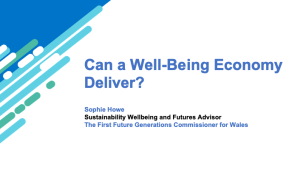 Download The Slide Pack
Download The Slide Pack
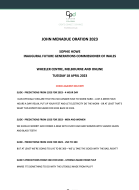 Download The Transcript Media CoverageSophie Howe, The World’s First Future Generations Advisor, On Planning For The Future. The Project. Monday 17 April 2023.
Wellbeing is a centrepiece in Welsh law, should Australia follow suit?
RN Breakfast with Patricia Karvelas. ABC Radio National. Monday 17 April 2023.
War, Space and the Future
– Q&A, ABC TV, Monday 24 April 2023Calling all “frustrated champions” – Australia’s future needs you, now. – Croakey Health Media, Melissa Sweet, Wednesday 26 April 2023.The link between economics and Mona Lisa and Wales striding towards a better future – The Money with Richard Aedy. ABC Radio National. Thursday 27 April 2023
Download The Transcript Media CoverageSophie Howe, The World’s First Future Generations Advisor, On Planning For The Future. The Project. Monday 17 April 2023.
Wellbeing is a centrepiece in Welsh law, should Australia follow suit?
RN Breakfast with Patricia Karvelas. ABC Radio National. Monday 17 April 2023.
War, Space and the Future
– Q&A, ABC TV, Monday 24 April 2023Calling all “frustrated champions” – Australia’s future needs you, now. – Croakey Health Media, Melissa Sweet, Wednesday 26 April 2023.The link between economics and Mona Lisa and Wales striding towards a better future – The Money with Richard Aedy. ABC Radio National. Thursday 27 April 2023 The post Can a Wellbeing Economy Deliver? | John Menadue Oration by Sophie Howe | April 2023 appeared first on Centre for Policy Development.
WATCH LIVE: John Menadue Oration delivered by Sophie Howe
As Australia pursues wellbeing in economic decision-making, the 2023 John Menadue Oration provides an audience with a global leader charting a course to a more resilient, sustainable future.
Sophie Howe is the outgoing inaugural Welsh Future Generations Commissioner and the world’s first public official empowered to protect the interests of future generations. Her appointment in 2016 represents the high watermark for wellbeing approaches to public decision-making.
Her tenure in the role reshaped public policy through a holistic, future-ready wellbeing lense, securing fundamental policy changes across land use, planning, major transport, criminal justice and housing. In CPD’s recent global scan on wellbeing approaches around the world, Redefining Progress, Wales emerged as one of the global leaders and Sophie is the champion for the Welsh wellbeing approach. She is eloquent and persuasive.
In the Oration, entitled ‘Can a Wellbeing Economy Deliver?’ Ms Howe will candidly share the lessons she learnt in working to embed a wellbeing approach in Wales and how those lessons are applicable in Australia to meet the long-term needs of people, communities and the environment.
Ms Howe will be joined in conversation by eminent Australian child wellbeing researcher and advocate Professor Fiona Stanley AC, moderated by CPD Chair Sam Mostyn AO.
The John Menadue Oration is CPD’s annual flagship event, named after our founding Chair John Menadue. Previous orations have been delivered by distinguished experts and academics such as former Indonesian Foreign Minister Marty Natalegawa, economist Professor Mariana Mazzucato and indigenous lawyer Professor Megan Davis.
The post WATCH LIVE: John Menadue Oration delivered by Sophie Howe appeared first on Centre for Policy Development.
Centre for Policy Development's Blog
- Centre for Policy Development's profile
- 1 follower



